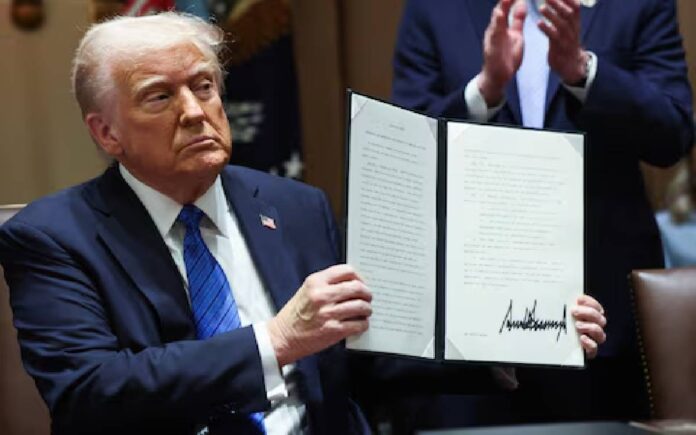Washington, D.C.: U.S. President Donald Trump faced significant legal setbacks as federal judges temporarily blocked key sections of his executive orders targeting prominent law firms Jenner & Block and WilmerHale. The rulings came on Friday, dealing a blow to Trump’s efforts to curb legal opposition from these firms.
The executive orders had sought to impose restrictions on these firms, including limitations on security clearances and access to federal courthouses. In response, the law firms challenged the directives in court, arguing that they violated constitutional rights and were politically motivated. Meanwhile, another major law firm, Skadden Arps, reached an agreement with the White House to avoid facing similar restrictions, Reuters reported.
Judicial Criticism of Trump’s Orders
U.S. District Judge John Bates strongly rebuked Trump’s directive against Jenner & Block, describing it as “disturbing” and “troubling”. Bates pointed out that the executive order specifically targeted the firm’s pro bono legal work supporting transgender individuals and immigrants. He also criticized the order’s opening section, which detailed accusations against Jenner & Block, calling it “reprehensible”.
Bates further noted that Trump’s directive could prevent the firm’s attorneys from entering federal courthouses managed by the executive branch, stating:
“Considering the firm-wide effects of the executive order, it threatens the existence of the firm”.
In a separate ruling, U.S. District Judge Richard Leon, overseeing the WilmerHale litigation, also sided against Trump’s order. He labeled the directive as retaliatory and approved the firm’s request to block sections restricting its attorneys’ access to government buildings and officials. However, he did not overturn the suspension of security clearances for WilmerHale’s lawyers.
Legal Firms Sue Trump Over Executive Orders
The lawsuits against Trump’s administration were initiated earlier on Friday by Jenner & Block and WilmerHale, escalating tensions between the former president and legal professionals. The firms argued that the executive orders were designed to punish them for their legal challenges against Trump’s policies, violating their constitutional rights to free expression and due process.
Following the court rulings, Jenner & Block released a statement:
“Consistent with the law, the court has agreed that this is an unconstitutional executive order holding no legal weight”.
The firm also emphasized that its lawsuit aimed to put an end to a directive that had already been ruled unlawful by a federal judge. Meanwhile, Perkins Coie, another major law firm, has also sued the Trump administration over similar issues and has achieved early legal victories in challenging the executive order.
Trump’s Executive Order Against Jenner & Block
Trump signed the controversial executive order on Tuesday, intensifying his criticism of leading U.S. law firms. The directive specifically targeted Jenner & Block, which has represented clients challenging his policies and previously employed Andrew Weissmann, a former senior federal prosecutor involved in Special Counsel Robert Mueller’s investigation into Russian interference in the 2016 election.
This move followed similar actions against Perkins Coie and Paul Weiss, which imposed restrictions on their attorneys’ security clearances, access to government buildings, and ability to secure federal contracts.
Trump, who is currently facing four criminal cases following his presidency, has repeatedly accused major law firms of conspiring with Democrats against him and his supporters. In defense of the executive orders, White House Staff Secretary Will Scharf claimed:
“Jenner & Block was weaponizing the legal system against American principles and values”.
Jenner & Block countered with a firm response, asserting:
“We remain focused on serving and safeguarding our clients’ interests with the dedication, integrity, and expertise that has defined our firm for more than one hundred years and will pursue all appropriate remedies”.
Conclusion
The legal battle over Trump’s executive orders underscores a broader conflict between the former president and major U.S. law firms, raising questions about the use of executive power to target legal adversaries. As court rulings continue to challenge the legality of these directives, the outcome may set significant precedents for executive authority and constitutional rights in the legal profession.



